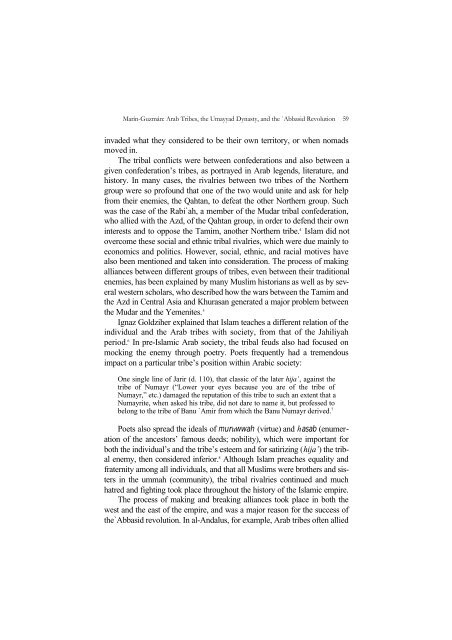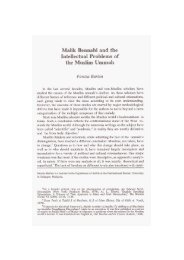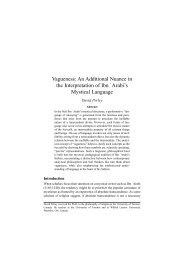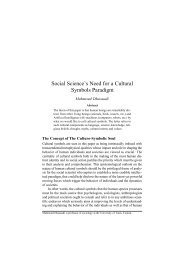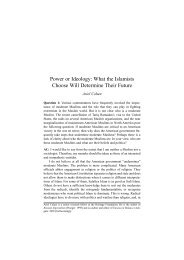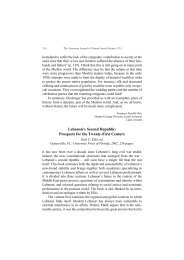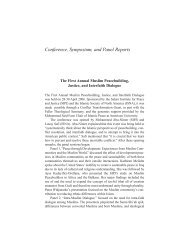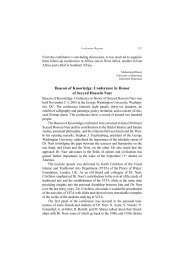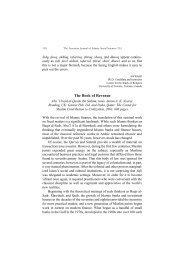Arab Tribes, the Umayyad Dynasty, and the `Abbasid ... - Epistemology
Arab Tribes, the Umayyad Dynasty, and the `Abbasid ... - Epistemology
Arab Tribes, the Umayyad Dynasty, and the `Abbasid ... - Epistemology
You also want an ePaper? Increase the reach of your titles
YUMPU automatically turns print PDFs into web optimized ePapers that Google loves.
Marín-Guzmán: <strong>Arab</strong> <strong>Tribes</strong>, <strong>the</strong> <strong>Umayyad</strong> <strong>Dynasty</strong>, <strong>and</strong> <strong>the</strong> <strong>`Abbasid</strong> Revolution 59<br />
invaded what <strong>the</strong>y considered to be <strong>the</strong>ir own territory, or when nomads<br />
moved in.<br />
The tribal conflicts were between confederations <strong>and</strong> also between a<br />
given confederation’s tribes, as portrayed in <strong>Arab</strong> legends, literature, <strong>and</strong><br />
history. In many cases, <strong>the</strong> rivalries between two tribes of <strong>the</strong> Nor<strong>the</strong>rn<br />
group were so profound that one of <strong>the</strong> two would unite <strong>and</strong> ask for help<br />
from <strong>the</strong>ir enemies, <strong>the</strong> Qahtan, to defeat <strong>the</strong> o<strong>the</strong>r Nor<strong>the</strong>rn group. Such<br />
was <strong>the</strong> case of <strong>the</strong> Rabi`ah, a member of <strong>the</strong> Mudar tribal confederation,<br />
who allied with <strong>the</strong> Azd, of <strong>the</strong> Qahtan group, in order to defend <strong>the</strong>ir own<br />
interests <strong>and</strong> to oppose <strong>the</strong> Tamim, ano<strong>the</strong>r Nor<strong>the</strong>rn tribe. 4 Islam did not<br />
overcome <strong>the</strong>se social <strong>and</strong> ethnic tribal rivalries, which were due mainly to<br />
economics <strong>and</strong> politics. However, social, ethnic, <strong>and</strong> racial motives have<br />
also been mentioned <strong>and</strong> taken into consideration. The process of making<br />
alliances between different groups of tribes, even between <strong>the</strong>ir traditional<br />
enemies, has been explained by many Muslim historians as well as by several<br />
western scholars, who described how <strong>the</strong> wars between <strong>the</strong> Tamim <strong>and</strong><br />
<strong>the</strong> Azd in Central Asia <strong>and</strong> Khurasan generated a major problem between<br />
<strong>the</strong> Mudar <strong>and</strong> <strong>the</strong> Yemenites. 5<br />
Ignaz Goldziher explained that Islam teaches a different relation of <strong>the</strong><br />
individual <strong>and</strong> <strong>the</strong> <strong>Arab</strong> tribes with society, from that of <strong>the</strong> Jahiliyah<br />
period. 6 In pre-Islamic <strong>Arab</strong> society, <strong>the</strong> tribal feuds also had focused on<br />
mocking <strong>the</strong> enemy through poetry. Poets frequently had a tremendous<br />
impact on a particular tribe’s position within <strong>Arab</strong>ic society:<br />
One single line of Jarir (d. 110), that classic of <strong>the</strong> later hija’, against <strong>the</strong><br />
tribe of Numayr (“Lower your eyes because you are of <strong>the</strong> tribe of<br />
Numayr,” etc.) damaged <strong>the</strong> reputation of this tribe to such an extent that a<br />
Numayrite, when asked his tribe, did not dare to name it, but professed to<br />
belong to <strong>the</strong> tribe of Banu `Amir from which <strong>the</strong> Banu Numayr derived. 7<br />
Poets also spread <strong>the</strong> ideals of muruwwah (virtue) <strong>and</strong> hasab (enumeration<br />
of <strong>the</strong> ancestors’ famous deeds; nobility), which were important for<br />
both <strong>the</strong> individual’s <strong>and</strong> <strong>the</strong> tribe’s esteem <strong>and</strong> for satirizing (hija’) <strong>the</strong> tribal<br />
enemy, <strong>the</strong>n considered inferior. 8 Although Islam preaches equality <strong>and</strong><br />
fraternity among all individuals, <strong>and</strong> that all Muslims were bro<strong>the</strong>rs <strong>and</strong> sisters<br />
in <strong>the</strong> ummah (community), <strong>the</strong> tribal rivalries continued <strong>and</strong> much<br />
hatred <strong>and</strong> fighting took place throughout <strong>the</strong> history of <strong>the</strong> Islamic empire.<br />
The process of making <strong>and</strong> breaking alliances took place in both <strong>the</strong><br />
west <strong>and</strong> <strong>the</strong> east of <strong>the</strong> empire, <strong>and</strong> was a major reason for <strong>the</strong> success of<br />
<strong>the</strong><strong>`Abbasid</strong> revolution. In al-Andalus, for example, <strong>Arab</strong> tribes often allied


